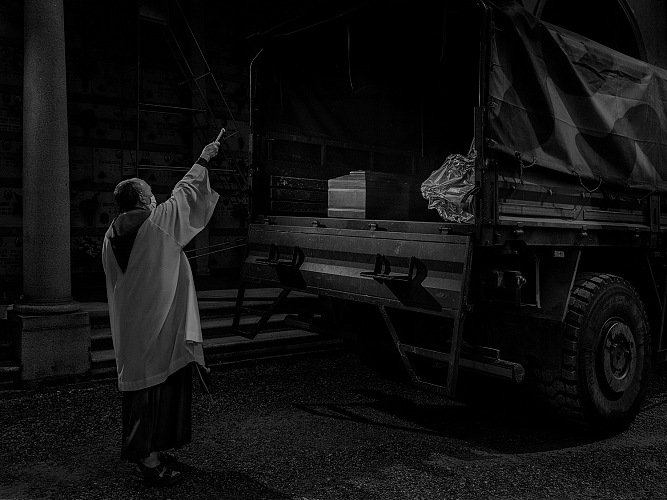The price of fatigue
That the working conditions of many people are extreme, bordering on the intolerable, is common knowledge. And often there is no need to even go very far to discover a chilling reality in which the quality of a man's life, his safety, and his physical and psychological health are worth less than what he produces. For work one can get sick. For work, one knows, one may even die. But if what is striking workers is a dark evil, of causes still undefined, that indifference continues to claim victims among the poorest of the poor, then we are not facing only a serious problem of social injustice, but of public health.
This is the case of the dramatic reality documented by Ed Kashi with his work Under Cane: A Worker's Epidemic, inserted in the Themed Area of: The food that kills and currently exhibited, in Lodi, at the Ex Church of San Cristoforo. The photojournalist of the VII Photos Agency in fact raises the curtain on a true medical emergency which, for decades, are confronted a large percentage of sugar cane growers in Central America. These farmers are affected by what can be defined as a real epidemic, a lethal infection, from origins, which are still uncertain, known as chronic kidney disease non-traditional causes (CKDnT). Most of the victims are concentrated in Nicaragua and in El Salvador, where, according to the Centre for Public Integrity, the deaths caused by CKDnT have now exceeded those made up of HIV, diabetes and leukaemia together. For these workers of the third millennium, life expectancy has stabilised at around 49 years old, but despite that little or nothing has been done, although some scientific evidence demonstrates how the onset of the disease is linked to poor working conditions, and that it would take very little to begin to stem the problem. «In the town of Chichigalpa, also called the Island of the Widows, one in three men (mostly sugar cane workers) suffers from terminal-stage renal failure due to this fatal disease [ ... ] – explains Ed Kashi – Research on the subject of CKDnT indicates that repeated dehydration, severe heat, and environmental toxins might play a huge part in the rising death toll among sugarcane workers [ ... ] With one private sugar mill in El Salvador poised to make history by becoming the site of the first ever CKDnT workplace intervention in Central America, labor conditions have improved due to increased water access, shade and mandatory breaks. However, since this fatal disease is both a global public health crisis and a social injustice, more research and health solutions are essential to continue creating a positive impact in the lives of effected workers, their families, and local communities».
In Ed Kashi’s opinion it is therefore essential that we start talking at length about this problem and to address it seriously at all levels, not just in the health sector. The photographs included in the exhibition therefore aim to raise awareness, to move as much as the individual as the health agencies and governments to find viable solutions in a short time. His images are striking not so much for what they show, but for what they document and subtend, thanks to the captions also. A real investigative journalism, interwoven with data and eyewitness accounts, aiming to inform in the hope of contributing actively in the improvement of the living conditions of these workers. Informing to help change things, this is its purpose as a photojournalist, as he himself says in the video interview that we issued during the opening weekend of the Festival, accessible via the link posted below. [ S. B. ]
- - -
UNDER CANE: A WORKER'S EPIDEMIC
by
Ed Kashi
Ex Chiesa di San Cristoforo | 10-11 / 17-18 / 24-25 October 2015
admission fee: 10,00 € (valid for the visit to all other exhibitions)
– – –
[ INTERNAL RESOURCES ]
◉ [ video ] Kashi: between journalism and activism
◉ FFE2015 on FPmag
[ EXTERNAL RESOURCES ]
◎ Food that kills
◎ Ed Kashi
◎ VII Photo Agency
◎ Festival of Ethical Photography
◎ Fujifilm Italia
published on 2015-10-16 in NEWS / EXHIBITIONS
FFE FFE2015 EdKashi StefaniaBiamontimore in EXHIBITIONS
categories
EXHIBITIONS CONTEST WORKSHOP EVENTS MELTINGPOT BOOKS PORTFOLIO VIDEO ONGOING THEMATICPATHS YTOI OPINIONS FPART COVER READINGIMAGES SMARTFOLIO FPBLOG FPLAB
recent news
FPmag
editor in chief Sandro Iovine | sandro.iovine@fpmagazine.eu - senior writer Stefania Biamonti - web developer Salvatore Picciuto | info@myphotoportal.com - linguistic coordination Nicky Alexander - translations Nicky Alexander, Rachele Frosini - contributor Davide Bologna, Mimmo Cacciuni Angelone, Laura Marcolini, Stefano Panzeri, Pio Tarantini, Salvo Veneziano - local Lazio correspondent Dario Coletti local Sardinian correspondent Salvatore Ligios - local Sicilian correspondent Salvo Veneziano - editorial office via Spartaco, 36 20135 Milano MI | redazione@fpmagazine.eu - phone +39 02 49537170 - copyright © 2015 FPmag - FPmag is a pubblication of Machia Press Publishing srl a socio unico, via Cristoforo Gluck, 3 20135 Milano MI - VAT no. 07535000967 C.F. (TAX code) 07535000967 - Copyright © 2015 FPmag - Registered at Tribunale di Milano No. 281 on the 9th September 2014

















































